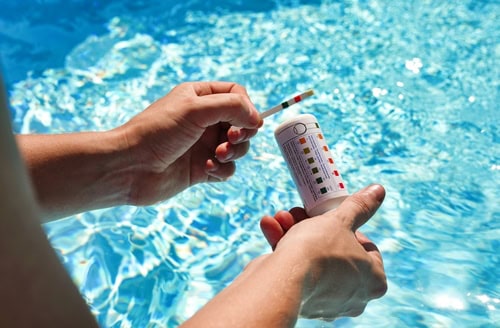How Does Pool Chemistry Affect A Pool’s Longevity?

Your backyard oasis represents a significant investment — one that should provide decades of enjoyment when properly maintained. While many pool owners focus on visible aspects, such as cleaning and equipment maintenance, the type of pool water used plays a crucial role in determining how long your swimming pool will last. Understanding the relationship between water chemistry and pool longevity can save you thousands of dollars in repairs and significantly extend your pool’s lifespan.
The chemistry of your pool water directly impacts every component of your swimming system, from the surface materials to pumps and filters. Whether you’re filling your pool with tap water, well water, or considering a saltwater system, each type presents unique challenges and benefits that affect your pool’s structural integrity over time.
Aqua Leisure Pools and Spas will break down how different water types influence pool longevity, the key chemical factors that matter most, and practical strategies for managing water chemistry to protect your investment for years to come.
Understanding Pool Water Chemistry
Pool water chemistry involves a delicate balance of several key factors that work together to maintain water quality and protect pool surfaces and equipment. When these elements fall out of balance, the consequences extend far beyond cloudy water or swimmer discomfort.
1. pH Levels: The Foundation of Pool Chemistry
pH levels represent one of the most critical factors affecting your pool’s longevity. This measurement determines whether your water is acidic or alkaline, with dramatic implications for pool surfaces and equipment.
- Low pH (acidic water) creates an aggressive environment that can etch and erode plaster and grout. Acidic conditions also corrode metal components, including ladders, light fixtures, pumps, filters, and heaters. This corrosion necessitates costly repairs or premature equipment replacements that can run into thousands of dollars.
- High pH (alkaline water) presents different but equally serious problems. Elevated pH levels reduce chlorine effectiveness and can lead to cloudy water and scaling on surfaces and equipment. This scaling buildup reduces equipment efficiency and creates rough surfaces that harbor bacteria and algae.
- Ideal pH levels should be maintained between 7.2 and 7.8 for optimal human comfort and effective chlorine sanitization, though many experts recommend a narrower range of 7.4 to 7.6 for best results.
2. Total Alkalinity: Your pH Buffer System
Total Alkalinity (TA) acts as a buffer system that prevents rapid pH fluctuations. This stability is essential for maintaining consistent water chemistry and protecting pool surfaces.
- Low TA creates unstable water conditions where pH levels can swing dramatically with minimal chemical additions or environmental changes. These fluctuations damage pool surfaces and equipment over time, while aggressive water conditions can destroy vinyl liners, solar covers, and inflatable accessories.
- High TA makes pH adjustment difficult and contributes to scaling problems. It also reduces chlorine efficiency, requiring higher sanitizer levels to maintain water quality.
- Ideal TA levels should range between 80-120 ppm to provide adequate buffering capacity without interfering with other chemical adjustments.
3. Calcium Hardness: Protecting Against Corrosion and Scaling
Calcium Hardness (CH) measures the amount of dissolved calcium in your pool water. This factor significantly impacts the lifespan of pool surfaces and equipment.
- Low CH (soft water) creates corrosive conditions that can devastate pool surfaces. Soft water leaches calcium from surfaces, such as plaster, grout, and tile, causing etching, pitting, and permanent stains. Metal components suffer similar damage, with corrosion occurring throughout the circulation system.
- High CH (hard water) causes scaling on pool surfaces and equipment. These deposits clog filters, decrease pump efficiency, and can lead to premature heater failure. Hard water scaling creates rough surfaces that become breeding grounds for algae and bacteria.
- Ideal CH levels depend on your pool type: 200-400 ppm for concrete or plaster pools, and 175-225 ppm for vinyl or fiberglass pools.
4. Sanitizer Levels: Balancing Protection and Equipment Safety
Proper sanitizer levels (chlorine or bromine) are essential for water safety, but incorrect levels can damage pool components.
- Insufficient sanitizer allows harmful bacteria and algae growth, compromising water quality and potentially damaging pool surfaces through biofilm formation and staining.
- Excessive sanitizer can damage equipment seals, gaskets, and other components, while also causing swimmer discomfort and potential health issues.
- Ideal chlorine levels should be maintained at 1.0-4.0 ppm, with a range of 2.0-4.0 ppm being generally accepted as optimal. Bromine systems should maintain 2.0-4.0 ppm.
5. Additional Chemical Factors
Cyanuric Acid (CYA) stabilizes chlorine against UV degradation but must be carefully managed. Low levels cause rapid chlorine loss in sunlight, while high levels reduce chlorine effectiveness and can damage plaster surfaces. Maintain 30-50 ppm for optimal protection.
Metals like copper and iron can cause staining and equipment damage. Well water often contains elevated levels of metals that require special treatment before pool use.
Your Path to Pool Perfection
Isn’t it time you finally had the in-ground swimming pool of your dreams? Proper water management ensures you’ll “soak in the memories” while relaxing, entertaining, and spending quality time with family and friends in your very own swimming pool for decades to come.
At Aqua Leisure Pools and Spas, with locations in Wilkes-Barre, Dickson City, and Tannersville/Bartonsville, our professionals bring over 60 years of experience to help you find the perfect swimming pool for your family. We provide comprehensive in-ground swimming pool services throughout Northeastern Pennsylvania, Allentown, PA, Doylestown, PA, and surrounding areas.
Our team can show you various pool models, essential accessories, and cleaning materials, making the process easy, simple, and exciting. We’re committed to helping you get a pool that will provide years of enjoyment through proper design, installation, and ongoing maintenance support. Contact us today to learn more about our in-ground pool offerings.
Posted by Aqua Leisure Pools & Spas in Pools

